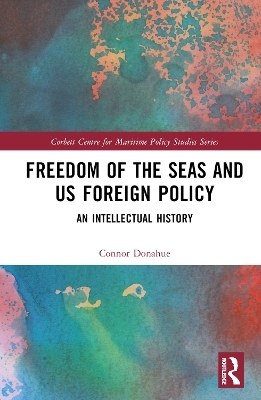
Freedom of the Seas and US Foreign Policy
An Intellectual History
Seiten
2024
Routledge (Verlag)
978-1-032-45149-7 (ISBN)
Routledge (Verlag)
978-1-032-45149-7 (ISBN)
This book critically analyzes US political-military strategy by arguing that freedom of the seas discourse is fundamentally unfit for an era of maritime great power competition.
The work conducts a genealogical intellectual history of freedom of the seas discourse in US foreign policy to show how the concept has evolved over time to facilitate American control over the global ocean space. It concludes that the contemporary discourse works to establish the high seas as an arena free from claims of sovereignty so that the United States, as the presumed unrivaled naval power, can intervene globally on behalf of its national interests. However, since sea control strategies depend on a preponderance of material force, as the United States wanes in relative material capability it becomes less able to support political-military strategies predicated on the assumption of global naval dominance. The book provides a timely commentary on the current geopolitical competition between the United States and China, and critiques the US approach toward China in the maritime domain in order to highlight potential avenues of foreign policy action that may enable the two countries to mitigate the risk of conflict.
This book will be of much interest to students of naval history, maritime security, US foreign policy, and international relations.
The work conducts a genealogical intellectual history of freedom of the seas discourse in US foreign policy to show how the concept has evolved over time to facilitate American control over the global ocean space. It concludes that the contemporary discourse works to establish the high seas as an arena free from claims of sovereignty so that the United States, as the presumed unrivaled naval power, can intervene globally on behalf of its national interests. However, since sea control strategies depend on a preponderance of material force, as the United States wanes in relative material capability it becomes less able to support political-military strategies predicated on the assumption of global naval dominance. The book provides a timely commentary on the current geopolitical competition between the United States and China, and critiques the US approach toward China in the maritime domain in order to highlight potential avenues of foreign policy action that may enable the two countries to mitigate the risk of conflict.
This book will be of much interest to students of naval history, maritime security, US foreign policy, and international relations.
Connor Donahue received his PhD from Virginia Polytechnic Institute and State University and his masters from King’s College London. He is currently working for the US Department of the Navy.
Introduction Part I: Mare Liberum 1. Setting the Stage 2. Charting a Course 3. The Institutionalization of Freedom of the Seas Discourse 4. Doctrinal Change at the Turn of the Century, 1880-1912 5. Woodrow Wilson and The First World War Part II: Mare Imperium 6. The Second World War 7. The Cold War – Part I 8. The Cold War – Part II 9. Post-Cold War Discourse Conclusion
| Erscheinungsdatum | 09.04.2024 |
|---|---|
| Reihe/Serie | Corbett Centre for Maritime Policy Studies Series |
| Verlagsort | London |
| Sprache | englisch |
| Maße | 156 x 234 mm |
| Gewicht | 630 g |
| Themenwelt | Geschichte ► Teilgebiete der Geschichte ► Militärgeschichte |
| Recht / Steuern ► Allgemeines / Lexika | |
| Recht / Steuern ► EU / Internationales Recht | |
| Sozialwissenschaften ► Politik / Verwaltung ► Europäische / Internationale Politik | |
| ISBN-10 | 1-032-45149-1 / 1032451491 |
| ISBN-13 | 978-1-032-45149-7 / 9781032451497 |
| Zustand | Neuware |
| Haben Sie eine Frage zum Produkt? |
Mehr entdecken
aus dem Bereich
aus dem Bereich
neueste Manipulationstechniken als Waffengattung der NATO
Buch | Softcover (2023)
Westend (Verlag)
CHF 33,55
Deutschlands Schwäche in der Zeitenwende
Buch | Softcover (2023)
C.H.Beck (Verlag)
CHF 25,20


